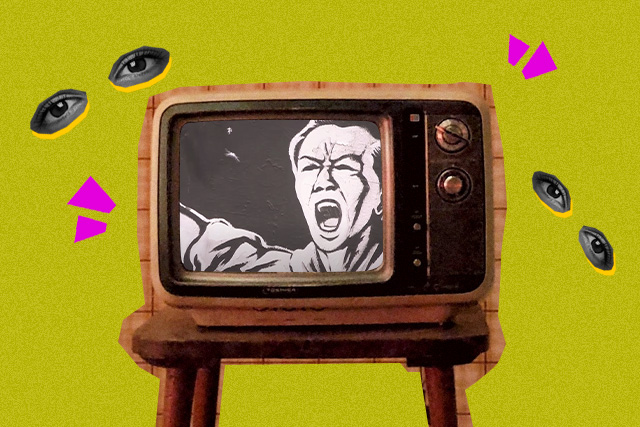Marking the 48th anniversary of former Pres. Ferdinand Marcos’ declaration of Martial Law, we once again reflect on the parallels between the late dictator and fellow strongman slash family friend Pres. Rodrigo Duterte. From cronyism (how else can we explain the appointment of the individuals who do not meet qualifications for their posts?) to infrastructure projects that exacerbated the national debt, Duterte seems to be taking pointers from the Marcosian playbook.
The words “never again” hold an urgency, with the threat (real or not) of nationwide Martial Law hovering in the minds of many Filipinos. In order to avoid a repeat of the past, we have to examine and remember the atrocities and the sacrifices that led us to where we are now.
How much have we moved past the abuses of power, if at all? Here’s a list of Martial Law documentaries that might have missed your radar. Set some time to check out these snapshots of a Philippine revolt.
“Portraits of Mosquito Press”
On “Portraits of Mosquito Press,” Director JL Burgos shines a light on the state of the Philippine press under Martial Law. The term mosquito press was coined in the era and used as a moniker for small publications that released biting exposes and critiques. His parents, Joe and Edith Burgos, sought the help of a number of college editors and family members to publish the alternative newspaper We Forum at a time when Marcos administration had control over mainstream media.
The documentary contains interviews from former staff members of the family-run newspaper where they also recount how the state sought to silence them—Burgos’ brother, Jonas Burgos, was an activist and victim of enforced disappearance. In the trailer, Edita Burgos shares, “During the Veteran’s celebration, Marcos was holding on to a newspaper and said, ‘I will make the publisher eat this.’ He was holding a copy of our newspaper.”
You can watch the entire film on the documentary’s Facebook page.
“1081”
Kara David hosts GMA News TV Special “1081,” a documentary that goes into the declaration of Proclamation No. 1081 and how Filipinos suffered under authoritarian rule. It examines how Martial Law was justified as a means to bring peace and order, to redistribute wealth for the poor and to bring forth a New Society. It also dives into the slaying and detainment of opposition leaders, activists and journalists—along with the strict implementation of curfew and the shutdown of several media outfits.
David interviews political leaders, journalists, human rights victims businessmen, military officials and former members of the Marcos administration to set the record straight on what really happened during those years. Interesting fact: Her mother, Karina Constantino-David, was a Martial Law activist who was nearly arrested but ultimately wasn’t because she was pregnant with Kara at the time.
“A Rustling of Leaves: Inside the Philippine Revolution”
It’s not often that armed Filipino revolutionaries are at the center of a documentary and so, “A Rustling of Leaves: Inside the Philippine Revolution” is definitely a historical gem—one that is finally making its local debut after a three-decade-long wait.
Daang Dokyu festival director Jewel Maranan said in an interview, “In my opinion, no sharper and more in-depth analysis of our nation’s conflicts and contradictions has been made in film than this distinctive documentary by Canadian filmmaker Nettie Wild.” The documentary is exclusively available for streaming on the festival’s website for a limited time.
It features the likes of New People’s Army founder Kumander Dante, guerrilla fighter slash priest Father Navarro as well as “Anti-Communist Crusade” radio DJ Jun Pala and even Sen. Ronald dela Rosa, back when he was a young lieutenant. The film has won awards in several foreign film festivals so don’t miss your chance to find out why.
“Marcos: A Malignant Spirit”
Another entry from Daang Dokyu’s lineup is “Marcos: A Malignant Spirit.” The film hosted by ABS-CBN News’ Angelo Castro Jr. contains rare footage and recordings that look into “the inhumane manner in which Marcos and his henchmen systematically drained the economy.”
Expect to see samples from the Marcos depositions and U.S. congressional hearings such as the ones on Marcos properties worth millions of dollars that expose a “‘complex web’ of companies used to conceal these investments.”
If you know anybody who’s still convinced that the Marcos family didn’t commit plunder, this might be the thing that convinces them otherwise.
“Shapes of Crimson”
“Shapes of Crimson” is director EJ Mijares’ documentary on fellow progressive filmmaker and writer Bonifacio Ilagan. A student activist from the University of the Philippines during Martial Law, he was abducted and tortured in the ’70s. He is also the brother of enforced disappearance victim Rizalina Ilagan.
Apart from his recollections and that of fellow Martial Law survivors, we also get a glimpse of the leftist movement now. We see clips from mass demonstrations (in the trailer, we see Anakbayan chairperson Vencer Crisostomo giving a speech) and a funeral for an activist. It proves that the movement is still alive and kicking and that the struggle for basic human rights never really stopped.
Art by Dana Calvo
Follow Preen on Facebook, Instagram, Twitter, YouTube and Viber
Related Stories:
5 WLW POC films to decolonize your queer watch list
A cheat sheet to the 15 Filipino films coming to Netflix
The best journalism films to remind you that it’s more important than ever
Watch these films if you want to understand Martial Law


